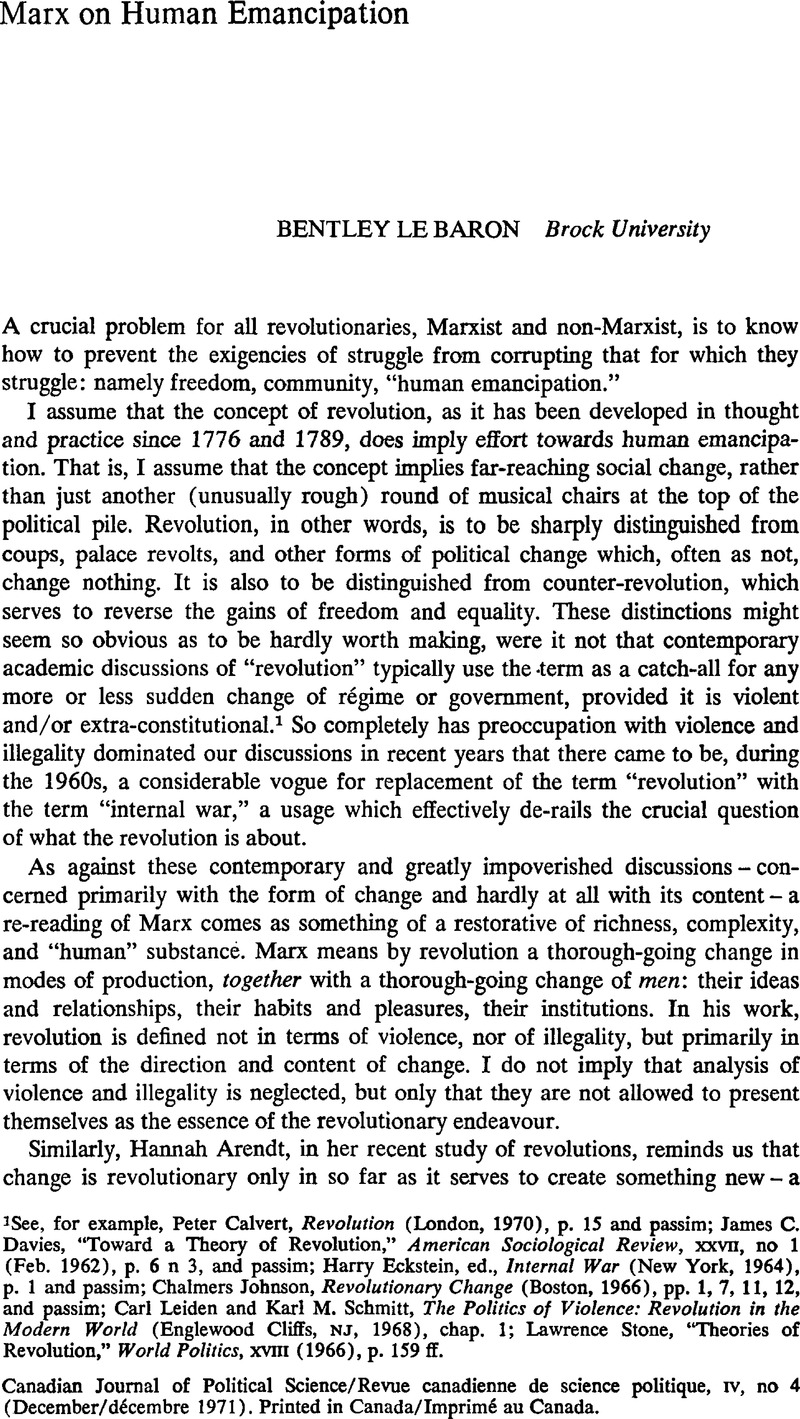Article contents
Marx on Human Emancipation
Published online by Cambridge University Press: 10 November 2009
Abstract

- Type
- Articles
- Information
- Canadian Journal of Political Science/Revue canadienne de science politique , Volume 4 , Issue 4 , December 1971 , pp. 559 - 570
- Copyright
- Copyright © Canadian Political Science Association (l'Association canadienne de science politique) and/et la Société québécoise de science politique 1971
References
1 See, for example, Calvert, Peter, Revolution (London, 1970), p. 15CrossRefGoogle Scholar and passim; Davies, James C., “Toward a Theory of Revolution,” American Sociological Review, XXVII, no 1 (Feb. 1962), p. 6Google Scholar n 3, and passim; Eckstein, Harry, ed., Internal War (New York, 1964), p. 1Google Scholar and passim; Johnson, Chalmers, Revolutionary Change (Boston, 1966), pp. 1, 7, 11, 12Google Scholar, and passim; Leiden, Carl and Schmitt, Karl M., The Politics of Violence: Revolution in the Modern World (Englewood Cliffs, NJ, 1968)Google Scholar, chap. 1; Stone, Lawrence, “Theories of Revolution,” World Politics, XVIII (1966), p. 159 ff.CrossRefGoogle Scholar
2 On Revolution (New York, 1965), chaps. 1 and 2, and passim. See also Marcuse, Herbert, “Ethics and Revolution,” Ethics and Society, ed. DeGeorge, R. T. (New York, 1966).Google Scholar Marcuse assumes what I am arguing: that revolution must aim at “altering the social as well as the political structure” (p. 134). Like Arendt, he holds that the function of revolutions in history has been “demonstrable enlargement of the range of human freedom” (p. 143).
There are, of course, other exceptions to my generalization about the impoverishment of contemporary academic discussions of revolution. For example, see the excellent article by Kamenka, Eugene, “The Concept of a Political Revolution,” Revolution, ed. Friedrich, Carl J. (New York, 1966)Google Scholar, reprinted in Struggles in the State, ed. Kelly, George A. and Brown, Clifford W. Jr., (New York, 1970).Google Scholar
3 An exception to this is Marcuse, who clearly sees that the relation between means and ends must be “dialectical.” “The end must be operative in the repressive means for attaining the end.” Ibid., p. 147.
4 “Contribution to the Critique of Hegel's Philosophy of Right, Introduction,” Karl Marx: Early Writings, ed. and trans. Bottomore, T. B. (New York, 1963), p. 53.Google Scholar
5 Marx in the Mid-Twentieth Century (Anchor, ed., Garden City, NY, 1967), p. 134.Google Scholar
6 “On the Jewish Question,” Writings of the Young Marx on Philosophy and Society, ed. and trans. Easton, L. D. and Guddat, K. H. (Anchor, ed., Garden City, 1967), pp. 226, 227.Google Scholar
7 Ibid., p. 231.
8 Ibid., 227.
9 Ibid., pp. 231 and 247.
10 “Critique of Hegel's Dialectic and General Philosophy,” Bottomore, Early Writings, p. 208.
11 Ibid.
12 “Private Property and Communism,” ibid., p. 152 ff.
13 Ibid., p. 153.
14 Ibid., pp. 159–61.
15 Ibid., p. 159.
16 Ibid., p. 158.
17 Ibid., p. 155.
18 Ibid., p. 162.
19 Marx, Karl and Engels, Frederick, The German Ideology, ed. Pascal, R. (New York, 1968), p. 74.Google Scholar
20 Ibid., p. 27.
21 At various times Marx acknowledged the possibility that in exceptional cases there might be a peaceful transition to socialism, perhaps via party politics and parliaments, as in England, Holland, or the United States of America, perhaps via traditional socialistic institutions, such as the “mir” in Russia. As Lenin put it, in one of his un-dogmatic moods:
“Marx did not commit himself, or the future leaders of the socialist revolution, to matters of form, to ways and means of bringing about the revolution…
“Marx taught that (as an exception, and Britain was then an exception) the idea was conceivable of paying the capitalists well, of buying them off, if the circumstances were such as to compel the capitalists to submit peacefully and to come over to socialism in a cultured and organized fashion, provided they were bought off.” Lenin, V. I., “The Tax in Kind,” Lenin on Politics and Revolution: Selected Writings, ed. Connor, James E. (New York, 1968), pp. 330–1.Google Scholar
Nevertheless, Marx and Lenin both argued that as a general rule violent struggle would be required to overthrow the entrenched violence of the bourgeois order.
22 Marcuse argues that “no matter how rational, how necessary, how liberating – revolution involves violence.” But he also notices that “there are forms of violence and suppression which no revolutionary situation can justify because they negate the very end for which the revolution is a means.” “Ethics and Revolution,” pp. 147, 141.
23 “A revolutionary movement must be able to give rational grounds for its chances to grasp real possibilities of human freedom and happiness, and it must be able to demonstrate the adequacy of its means for obtaining this end.” Ibid., p. 135.
24 An Essay on Liberation (Boston, 1969), p. 21.
25 According to Marcuse we are at a stage “where the people cannot reject the system of domination without rejecting themselves, their own repressive instinctual needs and values.” At this stage, “liberation would mean subversion against the will and against the prevailing interests of the great majority of the people.” Ibid., p. 17, my emphasis.
26 Marcuse remarks on “cruel affluence” and on “the affluent monster.” Ibid., pp. 6 and 7.
27 “The End of Utopia,” Five Lectures (Boston, 1970), p. 74.
28 Ibid., pp. 76, 77.
29 “On the Jewish Question,” p. 220.
30 Petrovic, Marx in the Mid-Twentieth Century, p. 130.
31 Marx and Engels, The German Ideology, p. 69.
- 9
- Cited by




